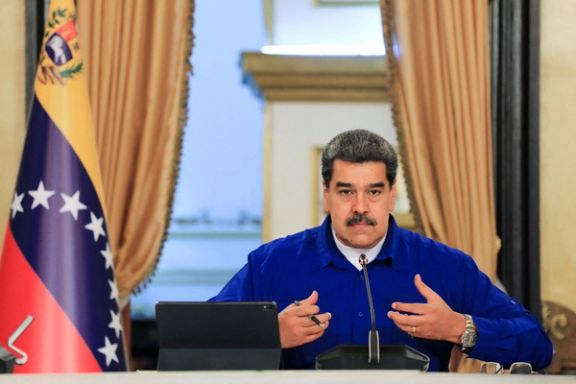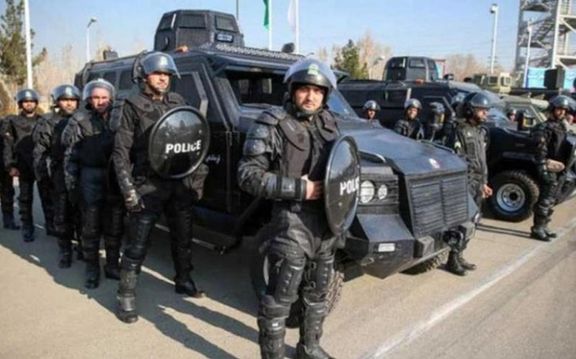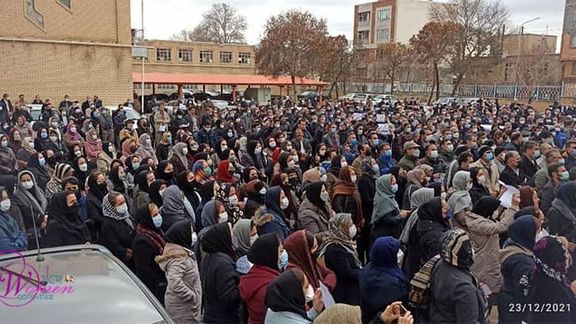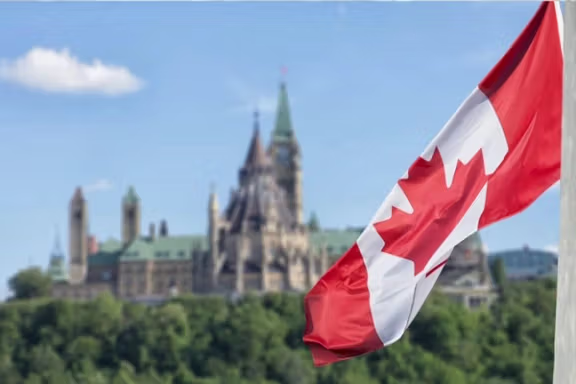Venezuela, Iran Pioneers Of New World Order, Maduro Says In Tehran

Venezuelan President Nicolas Maduro says his country and Iran are in the vanguard of the emerging global order, sharing a common goal of fighting colonialism and imperialism.

Venezuelan President Nicolas Maduro says his country and Iran are in the vanguard of the emerging global order, sharing a common goal of fighting colonialism and imperialism.
Maduro, who arrived in Tehran on Friday one day ahead of the announced schedule, made the remarks in an interview with Iran's state-run Spanish-language television channel Hispan TV.
He also announced that a 20-year cooperation plan with Iran will be signed between the two countries.
Describing Venezuela and Iran as the pioneers of shaping a world free of imperialism and dominant powers, Maduro said, “The era of the United States' military dominance of the world is over.”
He also urged sharing know-how with Iran in all fields, and hailed the Islamic Republic's “courageous move” to send fuel tankers to his energy-hungry nation despite US sanctions and threats.
He added that the delegation accompanying him to Tehran is aiming at facilitating further investments from Iran, noting that Iranians’ willingness to work in Venezuela indicates that resisting the US sanctions will eventually bear fruit.
Iran and Venezuela have been slapped with sanctions by the US, which doesn’t currently import oil from either nation, and has in recent years reimposed sanctions on Iranian state entities, including the national oil company NIOC, and in 2019 blacklisted PDVSA.
The two countries strengthened their cooperation in 2020, with Venezuela importing condensate from Iran, key to thinning its extra-thick crude oil. Iran has also stepped in to help its South American ally with engineers, refined products and spare parts for its oil industry.

Amid a growing wave of protests across Iran, the country’s police have added about $10 million worth of anti-riot equipment to law enforcement forces, including special armored vehicles.
The deputy commander of the Iranian police, Brigadier-General Ghasem Rezaei, made the announcement during a ceremony where some of the equipment was handed over to special units, including 527 vehicles and motorcycles.
Rezaei said that the new equipment and vehicles will help the operational units better execute their missions and is aimed at "strengthening the security of the country."
In addition to enhancing operational mobility, some of the new equipment provides police forces with “self-protection” during missions, he added.
Iran has tens of thousands of special police and security units that are often deployed to break up antigovernmental protests that have become more frequent since 2017.
In November 2019, when a sudden government price increase for fuel was announced and nationwide demonstrations began, these security forces were ordered to shoot unarmed protesters, killing at least 1,500 people in a matter of a few days.
Last year, special forces were used in two provinces to quell protests during which more than ten people were killed and hundreds wounded.

While many cities across Iran are scenes of protests by various union activists, Iranian teachers have announced a nationwide protest slated for next week.
The Coordination Council of Iranian Teachers’ Trade Associations issued a statement on Thursday, calling on teachers all over the country to take to streets on June 16 from 10:00 AM to 12:00 PM local time and demand their legal rights.
Teachers have been often holding protests for nearly a year, but the political situation in Iran has worsened in recent months, with rising food prices and a growing perception of government inefficiency and corruption.
The statement said their demands include better salaries, freedom of their colleagues arrested during the previous rounds of demonstrations as well as standard education facilities and free education for students. They also demand the implementation of decade-old legislation that would bring the salaries and pensions of 750,000 teachers in line with other civil servants.
Emphasizing that holding protests for their demands is among their basic rights, the statement added that the authorities are charging union activists with fabricated accusations of endangering the security of the country, as a last resort to repress the protests and ignore teachers’ demands.
“We declare loudly that if our colleagues are not released immediately and unconditionally, and the legitimate demands of Iranian teachers are not fulfilled, the protests will continue,” the statement read.
The teachers’ restlessness coincides with protests by Iranian retirees, which started Monday and continued Thursday in several cities across the country.
The pensioners, who are protesting the meager rise in their pensions while the inflation rate is hovering at over 40 percent, gathered in front of the offices of the Social Security Organization in the cities of Karaj, Zanjan and Arak among others. Just a few days ago the government announced that pensions for most retirees will increase by just 10 percent.
On Monday, enraged protesters chanted slogans such as “Death to Raisi”, directing their anger at President Ebrahim Raisi and denounced “empty promises” by the government. Videos surfaced on social media Thursday showing people cheering for the Pahlavis, who ruled Iran before the 1979 Islamic revolution, praising the Shah’s government for taking care of them.
On Tuesday, videos showed the bazaar in the northwestern city of Tabriz was on strike with merchants shutting down their stores and businesses in protest to a sudden increase in sales tax.
On Wednesday, similar strikes and protest rallies were reported by merchants in the southern city of Bandar Abbas.
Strikes in Bazaar, or traditional retail market, have a deep historical root in Iran and signal a serious political and economic crisis. The bazaar strikes played a major role both in the Constitutional Revolution of the early 20th century and the 1979 revolution against the monarchy.
Four years of deep economic crisis in Iran following the introduction of United States ‘maximum pressure’ sanctions in 2018 has led to sharp increases in living costs and to labor unrest. In January hundreds of firefighters and staff from the judiciary took to the streets in several cities. Prison guards have also picketed to protest their salaries.
People from different walks of life, including teachers, nurses, firefighters, and even judiciary department employees and prison guards, have held protest rallies or strikes to demand higher salaries.

Three human rights groups called on Meta, the owner of the social networks Instagram and Facebook, to review its Persian-language content review procedures for Iran.
Digital civil rights group Access Now, London-based rights organization Article 19, and New York-based Center for Human Rights in Iran met with a senior official from Meta on Thursday to convey their concerns over the company censoring content by Iranian dissidents and democracy advocates.
The groups said they made recommendations to Meta and Meta’s Oversight Board in an effort to streamline processes to ensure freedom of expression is protected for users who rely on their platform in Iran, especially during protests.
The groups initiated action following allegations that Instagram content moderators are deleting accounts that have documented the regime’s rights abuses during the latest wave of protests, including content showing Iranian security forces beating protesters and firing tear gas into crowds.
BBC’s sources alleged that pro-regime employees of the German branch of Telus International, a Canadian contractor, which provides content moderation to Instagram with over 400 Iranian employees for reviewing Persian-language content, are responsible for restricting anti-government content of Iranian users.
In an investigative report, Deutsche Welle Farsi revealed that Mehdi Norouzi, the son of a former Islamic Republic envoy to Bulgaria -- Abdollah Norouzi, works at the Telas International branch in Sofia.
US lawmakers have also launched a probe into the Meta’s restrictions on Iranian dissidents’ contents.

Iranian police Friday displayed recovered money and gold after they announced the arrest of 13 people allegedly involved in a recent large bank heist in Tehran.
The surprisingly quick reaction by the police still leaves many questions unanswered about the robbery of safety deposit boxes at a central branch of Bank Melli (National Bank) near Tehran University and half a mile distance from Supreme Leader Ali Khamnei’s headquarters and residence in central Tehran.
Officials produced a photo of nine people in prison uniform standing against a prison wall, with their faces hidden, while one police official claimed some had been arrested during a shootout and were wounded, but there was no indication in the photo of wounded detainees.
They also said that three of the 13 people detained were caught after fleeing to Turkey, but so far there are no reports in Turkish media.
Whoever robbed up to 250 safety deposit boxes took advantage of a long weekend in Iran and by some accounts they entered the vault housing the boxes sometime at night and completed the heist on Friday, but it remained unknown until Monday when the bank re-opened.
Tasnim news agency affiliated with the Revolutionary Guard published a video showing a large table covered with hundreds of plastic bags containing foreign currency, gold and documents, saying authorities have laid out the stolen loot for owners of the safety deposit boxes to identify.
It was not clear how officials separated the recovered money and gold in separate bags when they had said earlier that the bank had no idea what customers kept in their boxes, which is always the case in all banks.
Many Iranians remained skeptical of the whole saga, as earlier suspicions fell on political actors rather than ordinary criminals being behind the heist. Two lines of conspiracy theories quickly took root. First, that adversaries of the Islamic Republic who have been conducting sabotage acts in the country were behind what was seen as an extremely difficult operation.
Second, suspicions fell on internal actors who ostensibly broke into the bank not to steal money but to get hold of politically sensitive documents that current or former politicians might have hidden as a bargaining chip.
One theory circulating on social media pointed at documents possibly kept by former president Mahmoud Ahmadinejad, who has repeatedly threatened in the past to reveal secrets about politicians and officials. “Shall I tell?” is a well-known refrain by Ahmadinejad over the past decade.
The police have not said how they were able to catch the burglars in 48 hours, as they claimed on Friday. Their identities have also not been disclosed.
There are also no details yet about how the burglars were able to break through multiple security barriers in the bank, where according to earlier reports they also stole the main security server with all CCTV recordings.
Asked by reporters if bank employees might have been involved, Tehran’s police chief rejected the notion but accused the bank of failing to have adequate security measures in place. He added that one month earlier, police investigators who surveyed security at the branch warned the management of inadequate measures.

Canada has warned its citizens against all travel to Iran “due to the volatile security situation, the regional threat of terrorism and the possibility of arbitrary detention.
The Canadian government updated its travel advisory on Wednesday, pointing out that there is no resident Canadian government office in Iran, therefore the ability of Canadian officials to provide consular assistance is extremely limited.
The advisory said that Canadians in Iran may be closely watched by Iranian authorities, noting that seemingly innocuous behaviors, such as the use of cameras in public places, travel beyond well-established tourist attractions or casual interactions with Iranian friends, may be misinterpreted and may lead to investigation. Canadians in Iran could also face kidnapping and petty crimes, and women visitors may face sexual harassment.
The advisory update came as Canada announced on Tuesday that it has notified Iran of Ontario's Superior Court of Justice’s ruling that IRGC’s downing of Ukraine Airlines Flight PS752 was intentional. The airliner was shot down by two air-defense missiles fired by the IRGC on January 8, 2020, as it took off from Tehran’s Imam Khomeini International Airport.
Canada broke off diplomatic relations with Iran in 2012, citing its support to the Syrian government, non-compliance with United Nations resolutions over the nuclear program, and fears for Canadian diplomats after protestors stormed the British embassy.
Earlier in the week, the US also upgraded its Iran Travel Advisory to Level 4, which asked its citizens not to travel to the country, due to the risk of kidnapping and the arbitrary arrest and detention.